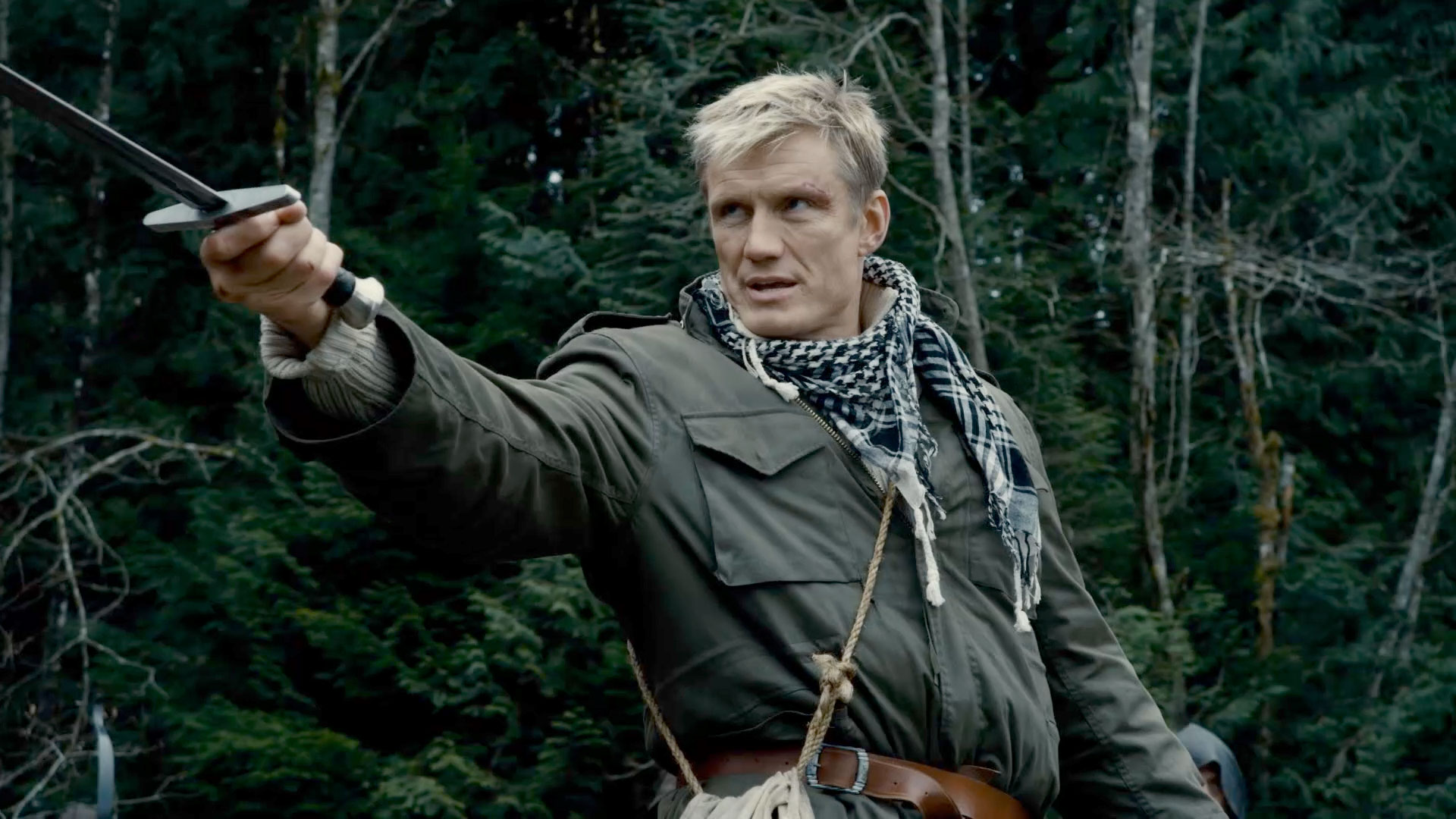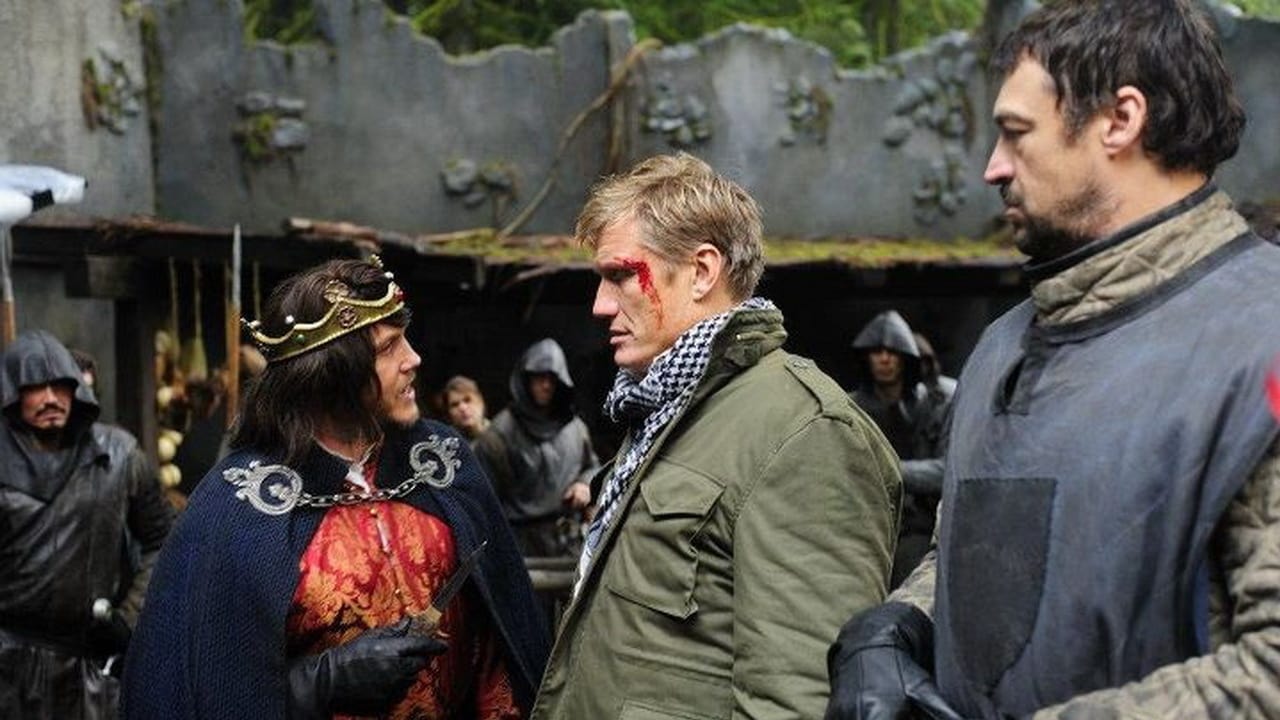Germany/Canada. 2011.
Crew
Director – Uwe Boll, Screenplay – Michael C. Nachoff, Producer – Daniel Clarke, Photography – Mathias Neumann, Music – Jessica de Rooij, Visual Effects Supervisors – Alexis Martinez & Michaël Massias, Visual Effects – Pistoleros & Seed Factory, Dragon Created by Pierre-Olivier Thevenin, Special Effects Supervisor – Jak Osmond, Production Design – Rick Willoughby. Production Company – Brightlight Pictures/Event Film/Pistoleros.
Cast
Dolph Lundgren (Granger), Lochlyn Munro (The King/Raven), Natassia Malthe (Manhatten), Aleks Paunovic (Allard), Christina Jastrzembska (Holy Mother), Heather Doersken (Dunyana), Elisabeth Rosen (Seer), Natalia Guslistaya (Elianna), Michael Adamthwaite (Thane), Michaela Mann (Young Woman)
Plot
Granger is a former Special Ops soldier who runs a martial arts dojo in Vancouver. His apartment is suddenly invaded by the black hooded Dark Ones who try to kill him. He is whisked through a magic portal to find himself in a mediaeval kingdom. He is welcomed by the king who regards Granger as the Chosen One that he believes has been prophesied will defeat the evil Holy Mother and her hordes of Dark Ones. Granger agrees to accept his role and sets out on a journey to eliminate the Holy Mother, although finds his path filled with assassins and treachery.
Uwe Boll probably needs no introduction as the figure that movie-going audiences currently love to hate and have dubbed the world’s worst (living) director. Boll has mostly become known for his videogame adaptations, which have included the likes of House of the Dead (2003), Alone in the Dark (2005), BloodRayne (2005), Postal (2007) and Far Cry (2008), most of which are widely ridiculed for their abandonment of game canon, absurd action sequences and/or ridiculous casting choices.
In the Name of the King: Two Worlds is a sequel to In the Name of the King: A Dungeon Siege Tale (2007). A Dungeon Siege Tale was based on the videogame Dungeon Siege (2002) from Microsoft Game Studio. I would argue that In the Name of the King: A Dungeon Siege Tale was one of Uwe Boll’s better films – it being made with a certain feel for epic fantasy and some good action scenes that overcame many of its other deficits. After having sequels to House of the Dead and Alone in the Dark made by other directorial hands, Boll clearly now looks to many of the films he now makes as potential franchises in the offing – he has turned out two sequels to BloodRayne, for instance.
In the Name of the King: Two Worlds is a nominal sequel to A Dungeon Siege Tale. Although, outside of Boll and some of his regular production crew, none of the cast or characters from the first film return. The story is supposedly set in the same world but a few years on – the only connection between the two is a couple of lines referring to the reign of Jason Statham’s farmer-king.

More importantly, where A Dungeon Siege Tale was entirely set inside a generic fantasy kingdom, In the Name of the King: Two Worlds features a standard action hero from present-day Earth who moves back and forward between the two realms – something that brings unpleasant association with the ghastly Beastmaster 2: Through the Portal of Time (1991). Two Worlds does not appear to be based on anything connected to the videogame and gives the impression that Uwe Boll is simply making another generic fantasy film with the In the Name of the King name attached to it.
While A Dungeon Siege Tale was enjoyably watchable (relatively speaking as Uwe Boll films go), In the Name of the King: Two Worlds heads down towards the standard of most of Boll’s turkeys. In this case, the main problem with the film is not so much Uwe Boll but Dolph Lundgren – unlike the first film, the only reasonably well-known name actor present, indicating a lowered budget. Dolph Lundgren had a modest career throughout the 1990s and 00s in a number of B-budget action films – gems like Dark Angel (1990) and The Punisher (1990) come to mind. He never attained the status of an Arnold Schwarzenegger, a Sylvester Stallone or even a Chuck Norris or a Jean-Claude Van Damme – almost all of the films he appeared in went to video/dvd release rather than to theatres, for instance – yet he is the only one among the group that seems to have any acting ability and is able to do anything more than come across as a block of wood.
The problem with In the Name of the King: Two Worlds is that Dolph Lundgren appears to not be taking much of the production seriously or to have turned up solely to collect a paycheque and treated the rest of the exercise as beneath him. It shows in his performance, which seems lazily aloof – although this does improve somewhat during the latter half when the film’s action content kicks in.
Aside from that, Lundgren has clearly had the show tailored so that he can throw in a barrage of Schwarzenegger-esque quips and one-liners. These are in a word excruciating and entirely drag the film down. Asked by Lochlyn Munro’s king, the meaning of his name, Lundgren shrugs and says: “Helps me get laid a lot.” He opines “You can take the prophecy and shove it up your ass” and taunts Aleks Paunovic’s guard: “Be a good royal bitch and show me my room.” There are voiceovers like “I began my day with a protein shake, now I’m in a mediaeval sleeping hut.” The king greets him: “You are alive, that is fortuitous,” to which Lundgren quips “You could have just sent champagne.” Maybe the worst line is when Lundgren enquires of Akeks Paunovic’s dour guard: “Do you get laid a lot? … or are you into the whole sword and sweaty sandals thing, Turkish baths?”

Even outside of that, In the Name of the King: Two Worlds fails to deliver much even in terms of what we expect of an Uwe Boll film. The action element is surprisingly tame. We get a couple of sword and knife fights in Dolph Lundgren’s apartment at the start of the film but after that have to wait nearly half the running time to get to any of the sword battles. This time, Uwe Boll does not have celebrated Hong Kong director/action choreographer Tony Ching Siu-Tung on board and most of the fight and battle scenes are adequate but unmemorable. This most disappointing part is the climactic showdown between Dolph Lundgren and Lochlyn Munro, which takes place as no more than the two of them fighting in and around the dull, ordinarily environs of the kitchen and bathroom of Dolph’s apartment.
There is also the irritating contrivations of the plot. [PLOT SPOILERS] At the outset, this sets up the decent and ordinary king on one side and the evil witch and her army of black hooded assassins on the other, before the mid-film twist reveals that it is the king who is the real bad guy. The twist in itself works as okay, nothing amazing, but when you trace the reverse logic it only becomes apparent how contrived it is – that a king who has a seer at his side would willingly ignore the prophecies she gives of his own doom but would send Dolph Lundgren to her to get the information to eliminate the witch yet somehow hope that in all of this, with a plan that includes Dolph being told about his predestined role and sending him into the witch’s camp, that Dolph would never manage to be figure out the truth of the situation.
Uwe Boll subsequently went onto make In the Name of the King 3 (2014) starring Dominic Purcell.
Uwe Boll’s other genre films are:- the serial killer films Amoklauf/Rampage (1994) and Sanctimony (2000); the backwoods horror Blackwoods (2002); the high school shooting rampage film Heart of America: Home Room (2002); the zombie film/videogameadaptation House of the Dead (2003); the monster movie/videogame adaptation Alone in the Dark (2005); the vampire hunting videogame adaptation BloodRayne (2005) and its sequels Bloodrayne: Deliverance (2007) and Bloodrayne: The Third Reich (2011); the videogame adaptation Postal (2007), a surreal bad taste satire about a shooting rampage; Seed (2007) about an executed killer returned from the grave; the videogame adaptation Far Cry (2008); Rampage (2009) about a man on a shooting spree and its sequels Rampage: Capital Punishment (2014) and Rampage: President Down (2016); Stoic (2009) about sadism and brutality in a prison; The Final Storm (2010) about an apocalyptic storm and the arrival of a mysterious stranger; the gonzo bad taste comedy Blubberella (2011) about an overweight vampire heroine; Assault on Wall Street/Bailout: The Age of Greed (2013) about a man on a shooting spree against bankers; and a segment of the horror anthology The Profane Exhibit (2013). Boll has also produced the ghost story They Wait (2007), Alone in the Dark II (2008), Zombie Massacre (2012), Legend of the Red Reaper (2013), Prisoners of the Sun (2013), Morning Star (2014), Viy (2014), Anger of the Dead (2015), Zombie Massacre 2: Reich of the Dead (2015) and Jack Goes Home (2016). Fuck You All: The Uwe Boll Story (2019) is a surprisingly insightful documentary about Boll and his career.
Trailer here


